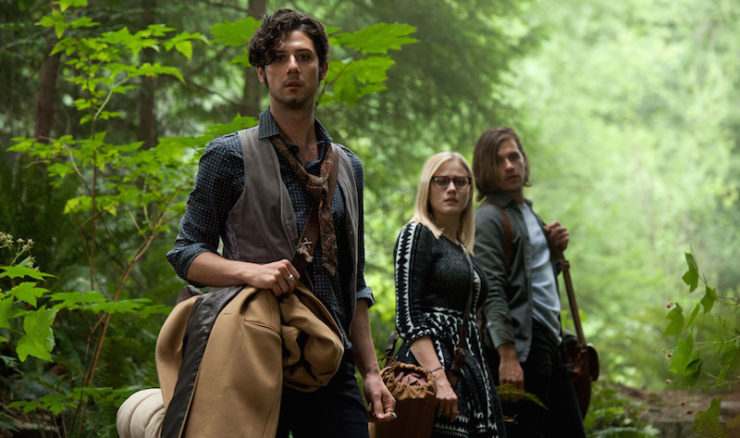After an intriguing but flawed first season, The Magicians is back and not messing around. Season two doesn’t take even the tiniest breather, but picks right up where we left off: everything is terrible, and everything hurts. We’re far out of book territory here—and so far, that seems to be a good thing.
Spoilers abound in the enchanted forest!
To recap the end of season one: Trying to kill the Beast, aka Martin Chatwin, didn’t go that well and basically everyone is maybe dead; Julia took off with the Beast and the knife that can kill him, in hopes that he can help her kill trickster (and rapist) Reynard; Fillory is not all that magical sometimes.
Quentin, somehow the only person left standing after the Beast battle, begins season two by failing to fix things. He tries, though, by running through the forest until he finds a whimsical seeming maybe-healer who now has a vial of his blood. He just underestimated the power of a bottle of god-jizz: While he ran, Alice woke up and fixed everybody. Sort of. Penny’s hands are in a box, no one has a plan, and everyone is furious at Julia for ruining what plan they did have. The magical Wellspring, they find out in short order, is running dry, and they’re not even sure they’re heroes in their story anymore. “We might be comic relief!” Margo all but wails.
After an initial flurry of action, “Knight of Crowns” settles into a pace that seems totally appropriate to the situation: Everything is happening at once, and all the characters’ worst traits are heightened by the uncertainty and fear that remains. They survived, but so what? The Beast might come back at any moment. Margo’s jokes are extra nasty, and she can’t find any sympathy for Julia; Alice panics when she realizes she has no idea what to do. Quentin does what he always does, which turns out, in this case, to be fairly useful: He picks up the nearest Fillory book.
I do hope this season isn’t just Quentin shouting “To the books!” whenever he needs a hint; it’s too easy, even if the clues are couched in unclear storytelling. But what they know of Fillory is useful, and sends Penny off to a healing stream while the rest of them try to take advantage of Eliot’s High Kingliness. He has access to a magical carriage, to the armory, to all kinds of things—or will once he gets his crown. So over the rainbow bridge (a glorious mass of flowers; I want to know how they made it) they go, to a beach that looks awfully familiar to this viewer of The 100. There they find the titular Knight of Crowns, who, despite being dead, will be so happy to give them their crowns—just as soon as they prove they’re really children of Earth.
They’ve got to prove this with ‘90s trivia.
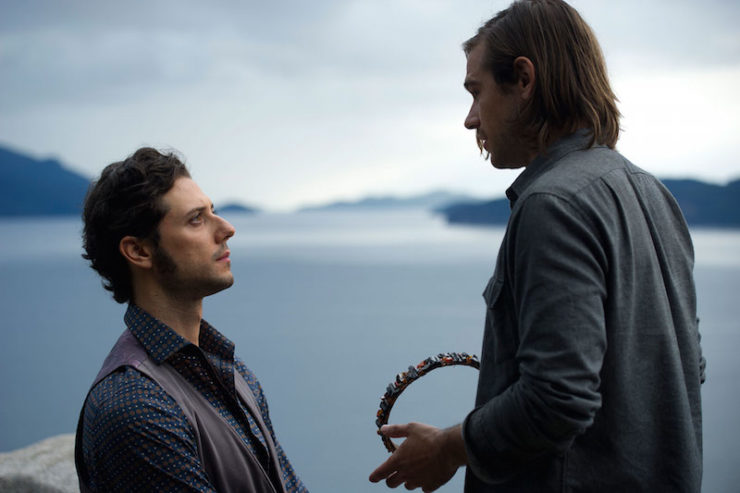
This scene is absurd, and wonderful, and perfect. It encapsulates the way Fillory is both magical and backwards: the Knight is dead, but still doing his job; the test is simple, but outdated; why would the Knight be so far from the castle, anyway, other than willful, bullheaded magical ridiculousness? And it demonstrates what The Magicians is best at: transforming a moment of sheer pop-culture meta-madness into something that deepens our understanding of the characters while also bringing them closer together.
I mean, of course Eliot knows that speech from Dirty Dancing. Of course he pulls Alice up there to be his Baby. Of course Eliot then gets a little bashful and tries to rush through the coronation, and of course Quentin knows that it means something, and that they should let it mean something.
And it does. They know each other, and they know how to give each other what they need. This is their step into adulthood; a crown is a responsibility. But maybe not a destiny, as Quentin observes:
“So destiny is, it’s bullshit. But you are a high king in your blood and somehow, that makes sense… and for what it’s worth, I think that you are going to be a really good king.”
Quentin crowns High King Eliot, the Spectacular (“This feels as natural as underwear” he says of his new headgear); Eliot crowns High Queen Margo, the Destroyer (“I mean that in the best possible sense”). When it comes to Queen Alice, the Wise, Eliot takes his moment to apologize, and when it’s Quentin’s turn, Margo takes that ball and runs with it:
“I could start by saying something cruel yet totally hilarious about you. Let’s be real: you’re an easy target. But that’s because you’re honest about what you love. And underneath it all, that’s inspiring. And I’m sorry, too. Not about the sex. I don’t even really remember it. Mostly my part in fucking up something that was good for you.”
“Thanks. I think I fucked it up just fine myself,” says King Quentin, the Moderately Socially Maladjusted.
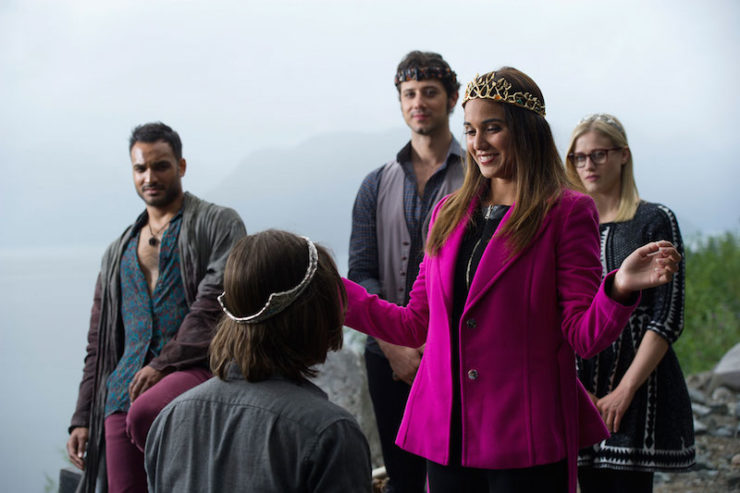
On the surface it seems strange, at first, that Margo’s the one crowning Quentin, but it makes sense, and what she says confirms that: She sees him for what he is, for good or bad, and she’s going to do what she does with that. But it’s not out of cruelty. It’s how she deals. It’s what keeps me from getting annoyed about how angry she is at Julia: I have faith that the show’s writers know that Margo is going to come around to understanding Julia’s trauma.
And that, after last season’s finale, is a good feeling. I’m still not thrilled with the stupid god-jizz plot, and I think the writing of Eliot’s character in the finale was really flawed. But the bittersweet balance of “Knight of Crowns” is a leap forward. The episode keeps the focus on the main crew—there’s no sign of Fogg, or Kady, even, and Penny keeps getting sent off on side quests—and acknowledges the places where their relationships are cracked and hurting. And it works with that, rather than ducking away from the pain—or reveling in it. They face it, and they keep going.
Quentin, for his part, spends most of the episode understanding what everyone else has lost. Alice accepts his apology, and he figures out how to encourage her. When Margo rages about Julia, Q defends her, saying that he wouldn’t be sane either after what she’s been through. And when the gang discovers that the Fillorian armory (which should full of books, natch) is depleted and they need to go back to Brakebills, it’s Q who listens to Eliot’s fears. Eliot can’t leave Fillory now, and ruling is not all throne rooms and champagne (which the Fillorians haven’t invented yet).
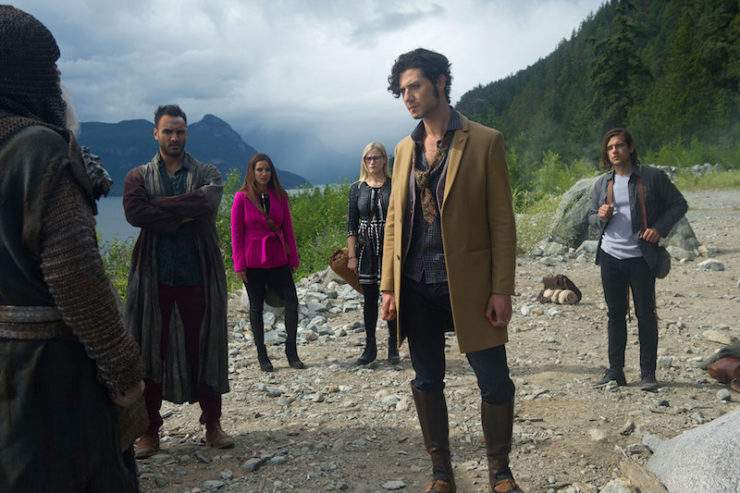
“I am trying to see this ruling thing as an adventure,” Eliot says, tentatively, but there are so many problems, and that’s not even counting the possibility that time might run differently in Fillory and on Earth. He could live his whole life before they return, and he’s trying to be calm about it. (He also needs a hug, and Hale Appleman’s face, in this moment, is so expressive, it could almost keep me watching this show even if everything else fell apart.)
And then there’s Penny, who gets his hands back—sort of. Penny’s interaction with the river keeper fellow is a curious one: I thought at first that Penny’s position, that the guy was trying to trick them, was logical, and that Margo was being uncharacteristically nice. But this might be another case where we underestimate her intuition, since Penny is presently cursed with misbehaving mitts. There’s a very Labyrinth quality to this whole side quest: Things are not always what they seem, and the twerp asking for gold coins might have a really good reason—while simultaneously being a total creeper (“Love women from Earth!”).
Penny’s predicament isn’t the first Fillorian reminder that actions, even just glib words, have consequences in Fillory just as they do on Earth, but it’s an effective way to remind us that our Earthlings are at a disadvantage in this magical realm. And what does the river keeper mean about Penny needing to learn about consequences due to the position in which he’ll find himself? Is he referring to the curse, or to something else?
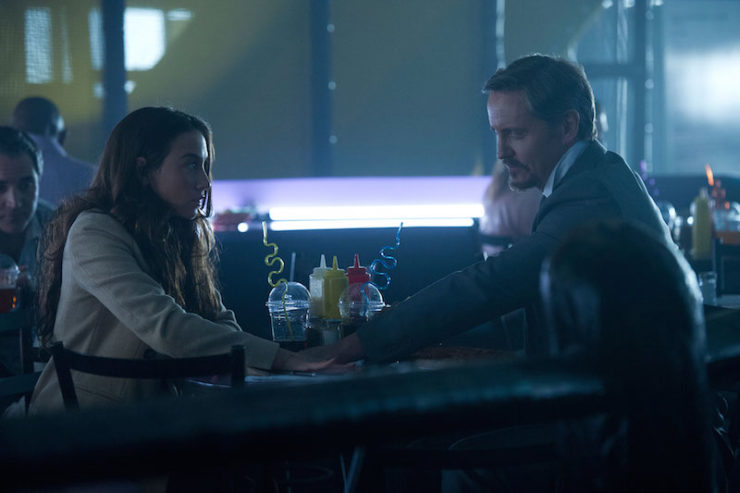
Back in drab, grey, washed-out Brooklyn, the Beast is barely chained. Julia, naturally, made him magically swear not to hurt her (or her friends) or get in her way until Reynard is dead. I’m not so sure she thought about what happens afterward. Martin, on the other hand, thinks about everything: Why does Reynard take hearts? What is he drawn to? Why was Julia spared? She wasn’t, Martin realizes, this damaged man who spent his childhood being abused by the man who was meant to look after him.
These two are an odd pair, but she’ll do just about anything to take down Reynard—even consider letting the Beast show her how to rid herself of her “shade,” the part of her that keeps her feeling and loving and hurting. When he’s not offering a callous sort of oblivion, Martin skips around her apartment, humming, or asking to be taken to a playground. “I like to watch the little children play. It’s perfectly innocent.” The Beast is full of terrifying whimsy, a damaged monster that never grew up and puts ketchup on his pizza. He doesn’t like people, he tells Julia, but he likes her. She could be part of his plans. What plans?
Martin is his own sort of trickster, playing to Julia’s defiant side, arguing that martyring herself to her pain is pointless, that Reynard still wins. But he’s just convinced himself that his version—feeling nothing—is better. If there’s one thing we know about Julia, it’s that she’s a master of finding her own way.
MAGICAL TIDBITS
- “Birds have computer accounts?”
- “It’ll also be ok if you just give my ass like a little squeeze.”
- One family has been running things in Castle Whitespire while the Earth children were gone—and I want to think the show is building to something with their choice to cast all people of color in these service positions, but so far I’m just raising an eyebrow at it.
- “Oh my god, those horses are so beautiful. I just really love horses.” Alice, we hardly know you, do we?
- Eliot saying “He loved me, he loved me not” with the flower petals is just crushing.
- Pretty certain Eliot’s “Must be a Monday” line is a callback to Buffy’s “Dawn’s in trouble! Must be Tuesday.”
Molly Templeton is Tor.com’s publicity coordinator, a movie critic for the Eugene Weekly, and a person who thinks everything is a Buffy reference.










